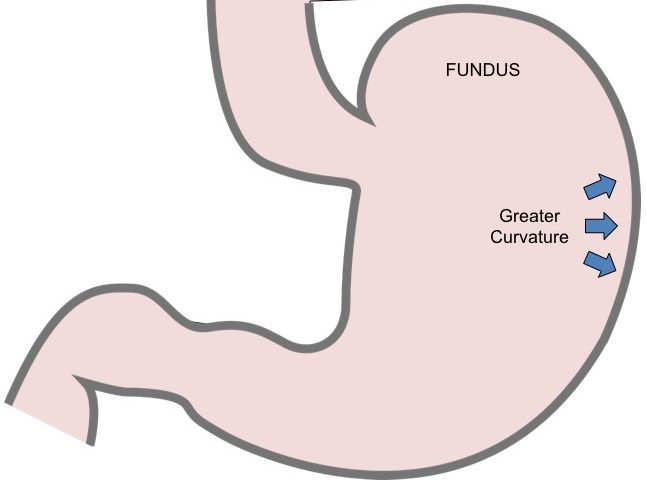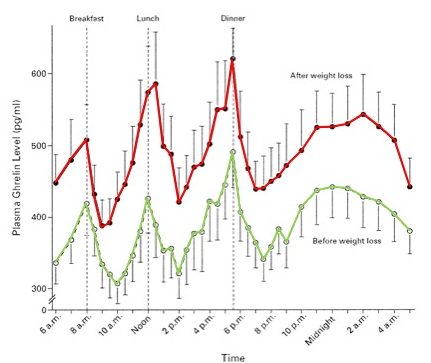Lets talk about Ghrelin. Ghrelin is a hormone produced in the stomach. In the funds and grater curvature of the stomach to be exact. This is the only hormone we know of right now that actually makes us hungry. All the other make us feel full… or not full/satiated when their levels are low. But Ghrelin, this little monster is the one that makes us want to eat, when we have not had a proper meal in several hours. It is the one that makes our stomachs growl. It is the one that makes that someone you love “hangry” (hunger+angry) when they are waiting for dinner to finish cooking.
Where does it come from?
Ghrelin in produced in the stomach. Specifically the part that doctors call the Funds, or the Greater Curvature of the stomach:

When is it produced?
Ghrelin is produced when our stomachs are empty. The longer our stomachs are empty the high and higher the level in our blood becomes. Ever try to start that intermittent fasting diet, and couldn’t make it past noon? that was Ghrelin’s fault. Maybe the snacks in the office, perfectly placed in your line of sight, were a constant reminder too. That feeling of depriving yourself and the elevated levels of Ghrelin, led you to eating all the granola bars at once, ending in the feeling that you “wish you didn’t do that”.
What does it do?
Ghrelin acts in the brain to stimulate the “Hunger Pathway”. It increases the motion of our gut making room for the new food to come in, and also decreases our levels of insulin, another hormone, that prevent our blood sugar from dropping too low, but also makes it hard for all our brain cells to get the sugar it is so used to having to work.
What happens with weight loss?
When we loose weight, our baseline ghrelin increases, and the peaks levels, the high levels right before we eat, are even higher. This increase in ghrelin is one of the many reasons that will power has no chance on its own, and why we seem to do so well for a few months, and then being to give in to our cravings.

Can I make it stop?
No , it is a natural process. With out it, we would never feel hungry possibly, with too much of it we would eat all the time. There is a genetic syndrome that produce mega doses of ghrelin called Prader-Willi Syndrome. For these individuals, the urge to eat or the feeling of hunger is constant. Locks may even be needed on the cabinets and refrigerators. There is no amount of “self control”. that could ever help.
While we can’t make it stop, there are somethings that may help:
Stress will increase your ghrelin levels above their baseline, and drive you to be more hungry.
Lack of Sleep – sleep deprivation will raise those ghrelin levels too.
I am describing most everyone one here and probably you. All the stress you have been under, loosing sleep either to catch up, or stay on top of things, so you don’t get more stress. Meditaion and a long night sleep would be great in helping you lead a healthier life, and would decrease those baseline ghrelin levels, but it is hard to do. See the post on improving your sleep on limited sleep time. And mediation is a ridiculous ting to have time for when we are so busy, but also look into why mindfulness might lead us to weightlessness.
How can I still Lose weight?
Thousands of people lose weight despite this elevation in ghrelin. We also now know that there are certain bariatric procedures with limited side effects, that can help reduce the production of Ghrelin, aging weight loss. And while we do not yet have a medication that inhibits the action of ghrelin, There are many great medications available that can aide in the feeling of satiety and reduction in hunger.